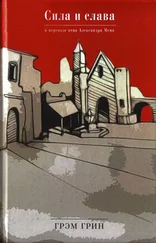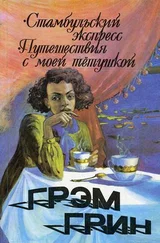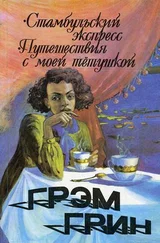Грэм Грин - The Comedians
Здесь есть возможность читать онлайн «Грэм Грин - The Comedians» весь текст электронной книги совершенно бесплатно (целиком полную версию без сокращений). В некоторых случаях можно слушать аудио, скачать через торрент в формате fb2 и присутствует краткое содержание. Год выпуска: 1966, Жанр: Классическая проза, на английском языке. Описание произведения, (предисловие) а так же отзывы посетителей доступны на портале библиотеки ЛибКат.
- Название:The Comedians
- Автор:
- Жанр:
- Год:1966
- ISBN:нет данных
- Рейтинг книги:3 / 5. Голосов: 1
-
Избранное:Добавить в избранное
- Отзывы:
-
Ваша оценка:
- 60
- 1
- 2
- 3
- 4
- 5
The Comedians: краткое содержание, описание и аннотация
Предлагаем к чтению аннотацию, описание, краткое содержание или предисловие (зависит от того, что написал сам автор книги «The Comedians»). Если вы не нашли необходимую информацию о книге — напишите в комментариях, мы постараемся отыскать её.
The Comedians — читать онлайн бесплатно полную книгу (весь текст) целиком
Ниже представлен текст книги, разбитый по страницам. Система сохранения места последней прочитанной страницы, позволяет с удобством читать онлайн бесплатно книгу «The Comedians», без необходимости каждый раз заново искать на чём Вы остановились. Поставьте закладку, и сможете в любой момент перейти на страницу, на которой закончили чтение.
Интервал:
Закладка:
'The spirit of the man.' Mr Smith exclaimed in the passage outside. 'It's what brought you people safely through the blitz. I'll get him out of there if I have to go to the President himself.'
I looked at the fold of paper in my hand. I recognized the name written there. It was that of an officer in the Tontons Macoute. I said, 'I wonder if we ought to involve ourselves any further.'
'We are involved,' Mr Smith said with pride, and I knew that he was thinking in the big terms I could not recognize, like Mankind, Justice, the Pursuit of Happiness. It was not for nothing that he had been a presidential candidate.
Chapter V
1
NEXT day a number of things distracted me from the fate of Jones, but I do not believe that Mr Smith for one moment forgot him. I saw him in the bathing-pool at seven in the morning, lumbering up and down, but that slow motion — from the deep to the shallow end and back — probably aided him to think. After breakfast he wrote a number of notes which Mrs Smith typed for him on a portable Corona, using two fingers, and he dispatched them through Joseph by taxi — one note was to his embassy, another to the new Secretary for Social Welfare whose appointment had been announced that morning in Petit Pierre's paper. He had enormous energy for a man of his age, and I am sure he was never for a moment distracted from the thought of Jones sitting on the bucket in his prison cell while he remembered the vegetarian centre, which one day would remove acidity and passion from the Haitian character. Simultaneously he was planning an article on his travels which he had promised to write for his home-town journal — a journal needless to say Democratic and anti-segregationist and sympathetic towards vegetarianism. He had asked me the day before to look his manuscript over for errors of fact. 'The opinions of course are my own,' he added with the wry smile of a pioneer.
My first distraction came early, before I had got up, when Joseph knocked on my door to tell me that against all probability the body of Doctor Philipot had already been discovered; as a consequence several people had left their homes and taken refuge in the Venezuelan Embassy, includinig a local police-chief, an assistant-postmaster and a schoolteacher (no one knew what their connections had been with the ex-Minister). It was said that Doctor Philipot had killed himself, but of course no one knew how the authorities would describe his death — as a political assassination, perhaps, engineered from the Dominican Republic? It was believed the President was in a state of fury. He had badly wanted to get his hands on Doctor Philipot who one night recently under the influence of rum was said to have laughed at Papa Doc's medical qualifications. I sent Joseph to the market to gather all the information he could.
My second distraction was the news that the child Angel was ill with mumps — in great pain, Martha wrote to me (and I couldn't help wishing him another turn of the screw). She was afraid to leave the embassy in case he asked for her, so it was impossible for her to meet me that night as we had arranged by the Columbus statue. But there was no reason, she wrote, why, after my long absence, I should not call in at the embassy — it would seem natural enough. A lot of people made a point of dropping in now that the curfew had been raised, if they could avoid the eye of the policeman at the gate, and he usually took a ration of rum in the kitchen at nine. She supposed they were preparing the ground in case a time came when they wanted to claim political asylum in a hurry. She added at the end of her note: 'Luis will be pleased. He thinks a lot of you' — a phrase which could be interpreted two ways.
Joseph came to my office after breakfast, when I was reading Mr Smith's article, to tell me the whole story of the discovery of Doctor Philipot's body as it was now known to the stall-holders in the market, if not yet to the police. It was one chance in a thousand which had led the police to the corpse that Doctor Magiot and I had expected to lie concealed for weeks in the ex-astrologer's garden: a bizarre chance, and the story made it hard for me to pay much attention to Mr Smith's manuscript. One of the militiamen on the road-block below the hotel had taken a fancy to a peasant woman who was on her way up to the big market at Kenscoff early that morning. He wouldn't let her pass, for he claimed she was carrying something concealed underneath her layers of petticoat. She offered to show him what she had there and they went off together down the side-road and into the astrologer's deserted garden. She was in a hurry to complete the long road to Kenscoff, so she went quickly down upon her knees, flung up her petticoats, rested her head on the ground, and found herself staring into the wide glazed eyes of the ex-Minister for Social Welfare. She recognized him, for in the days before he came to political office he had attended her daughter in a difficult accouchement.
The gardener was outside the window, so I tried not to show undue interest in Josephs narrative. Instead I turned a page of Mr Smiths article. 'Mrs Smith and I,' he had written, 'left Philadelphia with much regret after we had been entertained by the Henry S. Ochs's whom many readers will remember for their hospitable New Year parties at the time they occupied 2041 DeLancey Place, but the sorrow of leaving our good friends was soon lost in the pleasure of making new ones on the S.S. Medea …'
'Why did they go to the police?' I asked. The natural thing for the couple to have done after the discovery was to slip away and say nothing.
'She scream so loud the other militiaman he come,'
I skipped a page or two of Mrs Smith's typewriting and came to the arrival of the Medea at Port-au-Prince. 'A black republic — and a black republic with a history, an art and a literature. It was as if I were watching the future of all the new African republics, with their teething troubles over.' (He had no intention, I am sure, of appearing pessimistic.) 'Of course a great deal remains to be done even here. Haiti has experienced monarchy, democracy and dictatorship, but we must not judge a coloured dictatorship as we judge a white one. History in Haiti is a matter of a few centuries, and if we still make mistakes, after two thousand years, how much more right have these people to make similar mistakes and to learn from them perhaps better than we have done? There is poverty here, there are beggars in the streets, there is some evidence of police authoritarianism' (he had not forgotten Mr Jones in his cell), 'but I wonder whether a coloured man landing for the first time in New York would have received the courtesy and friendly help which Mrs Smith and I enjoyed at the immigration office of Port-au-Prince.' I seemed to be reading about a different country.
I said to Joseph, 'What are they doing with the body?'
The police wanted to keep it, he said, but the ice-plant at the mortuary was not working.
'Does Madame Philipot know?'
'Oh yes, she has him in Monsieur Hercule Dupont's funeral parlour. I think they bury him, double-quick.'
I couldn't help a feeling of responsibility for Doctor Philipot's last rites — he had died in my hotel. 'Let me know what the arrangements are,' I said to Joseph and turned back to Mr Smith's travelogue.
'For an unknown stranger like myself to be given an interview by the Secretary of State on my first day in Port-au-Prince was another example of the astonishing courtesy which I have met everywhere here. The Secretary of State was about to leave for New York to attend the conference of the United Nations; nonetheless he gave me half an hour of his precious time and enabled me, through his personal intervention with the Secretary for the Interior, to visit an Englishman in prison, a fellow-passenger on the Medea who had unfortunately — through some bureaucratic mistake liable to happen in much older countries than Haiti — fallen foul of the authorities. I am following the case up, but I have small fear of the result. Two qualities which I have always found strongly implanted in my coloured friends — whether living in the relative freedom of New York or the undisguised tyranny of Mississippi — are a regard for justice and a sense of human dignity.' In reading Churchill's prose works one is aware of an orator addressing an historic chamber, and in reading Mr Smith I was conscious of a lecturer in the hall of a provincial town. I felt surrounded by well-meaning middle-aged women in hats who had paid five dollars to a good cause.
Читать дальшеИнтервал:
Закладка:
Похожие книги на «The Comedians»
Представляем Вашему вниманию похожие книги на «The Comedians» списком для выбора. Мы отобрали схожую по названию и смыслу литературу в надежде предоставить читателям больше вариантов отыскать новые, интересные, ещё непрочитанные произведения.
Обсуждение, отзывы о книге «The Comedians» и просто собственные мнения читателей. Оставьте ваши комментарии, напишите, что Вы думаете о произведении, его смысле или главных героях. Укажите что конкретно понравилось, а что нет, и почему Вы так считаете.



